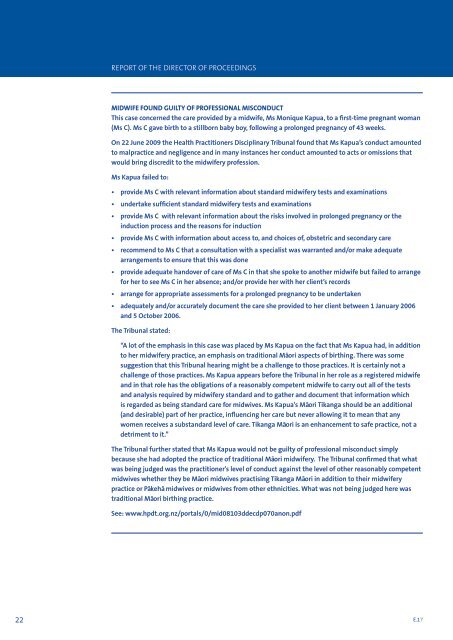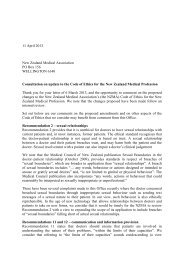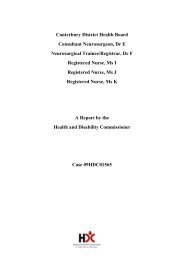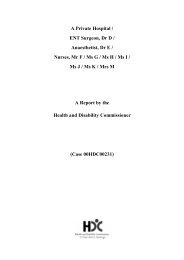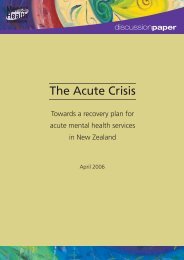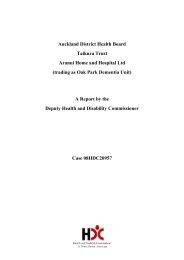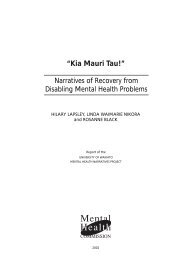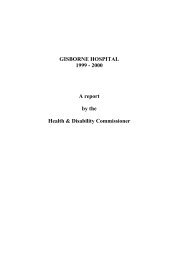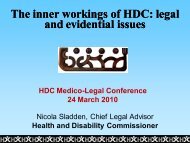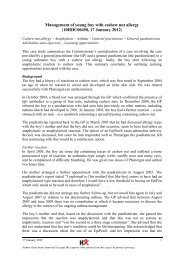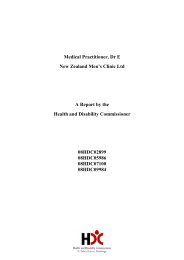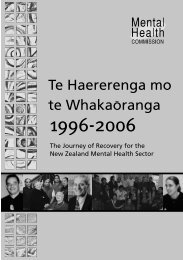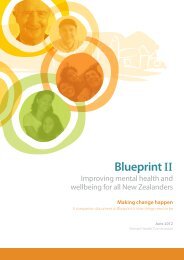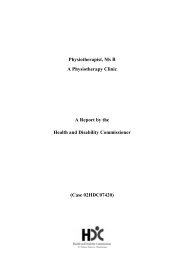Annual Report for the year ended 30 June 2009 - Health and ...
Annual Report for the year ended 30 June 2009 - Health and ...
Annual Report for the year ended 30 June 2009 - Health and ...
Create successful ePaper yourself
Turn your PDF publications into a flip-book with our unique Google optimized e-Paper software.
REPORT OF THE DIRECTOR OF PROCEEDINGS<br />
MIDWIFE FOUND GUILTY OF PROFESSIONAL MISCONDUCT<br />
This case concerned <strong>the</strong> care provided by a midwife, Ms Monique Kapua, to a first-time pregnant woman<br />
(Ms C). Ms C gave birth to a stillborn baby boy, following a prolonged pregnancy of 43 weeks.<br />
On 22 <strong>June</strong> <strong>2009</strong> <strong>the</strong> <strong>Health</strong> Practitioners Disciplinary Tribunal found that Ms Kapua’s conduct amounted<br />
to malpractice <strong>and</strong> negligence <strong>and</strong> in many instances her conduct amounted to acts or omissions that<br />
would bring discredit to <strong>the</strong> midwifery profession.<br />
Ms Kapua failed to:<br />
• provide Ms C with relevant in<strong>for</strong>mation about st<strong>and</strong>ard midwifery tests <strong>and</strong> examinations<br />
• undertake sufficient st<strong>and</strong>ard midwifery tests <strong>and</strong> examinations<br />
• provide Ms C with relevant in<strong>for</strong>mation about <strong>the</strong> risks involved in prolonged pregnancy or <strong>the</strong><br />
induction process <strong>and</strong> <strong>the</strong> reasons <strong>for</strong> induction<br />
• provide Ms C with in<strong>for</strong>mation about access to, <strong>and</strong> choices of, obstetric <strong>and</strong> secondary care<br />
• recommend to Ms C that a consultation with a specialist was warranted <strong>and</strong>/or make adequate<br />
arrangements to ensure that this was done<br />
• provide adequate h<strong>and</strong>over of care of Ms C in that she spoke to ano<strong>the</strong>r midwife but failed to arrange<br />
<strong>for</strong> her to see Ms C in her absence; <strong>and</strong>/or provide her with her client’s records<br />
• arrange <strong>for</strong> appropriate assessments <strong>for</strong> a prolonged pregnancy to be undertaken<br />
• adequately <strong>and</strong>/or accurately document <strong>the</strong> care she provided to her client between 1 January 2006<br />
<strong>and</strong> 5 October 2006.<br />
The Tribunal stated:<br />
“A lot of <strong>the</strong> emphasis in this case was placed by Ms Kapua on <strong>the</strong> fact that Ms Kapua had, in addition<br />
to her midwifery practice, an emphasis on traditional Māori aspects of birthing. There was some<br />
suggestion that this Tribunal hearing might be a challenge to those practices. It is certainly not a<br />
challenge of those practices. Ms Kapua appears be<strong>for</strong>e <strong>the</strong> Tribunal in her role as a registered midwife<br />
<strong>and</strong> in that role has <strong>the</strong> obligations of a reasonably competent midwife to carry out all of <strong>the</strong> tests<br />
<strong>and</strong> analysis required by midwifery st<strong>and</strong>ard <strong>and</strong> to ga<strong>the</strong>r <strong>and</strong> document that in<strong>for</strong>mation which<br />
is regarded as being st<strong>and</strong>ard care <strong>for</strong> midwives. Ms Kapua’s Māori Tikanga should be an additional<br />
(<strong>and</strong> desirable) part of her practice, influencing her care but never allowing it to mean that any<br />
women receives a subst<strong>and</strong>ard level of care. Tikanga Māori is an enhancement to safe practice, not a<br />
detriment to it.”<br />
The Tribunal fur<strong>the</strong>r stated that Ms Kapua would not be guilty of professional misconduct simply<br />
because she had adopted <strong>the</strong> practice of traditional Māori midwifery. The Tribunal confirmed that what<br />
was being judged was <strong>the</strong> practitioner’s level of conduct against <strong>the</strong> level of o<strong>the</strong>r reasonably competent<br />
midwives whe<strong>the</strong>r <strong>the</strong>y be Māori midwives practising Tikanga Māori in addition to <strong>the</strong>ir midwifery<br />
practice or Pākehā midwives or midwives from o<strong>the</strong>r ethnicities. What was not being judged here was<br />
traditional Māori birthing practice.<br />
See: www.hpdt.org.nz/portals/0/mid08103ddecdp070anon.pdf<br />
22 E.17


